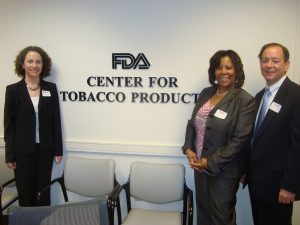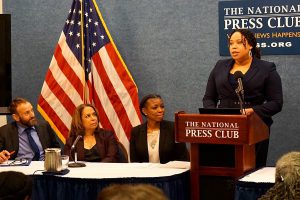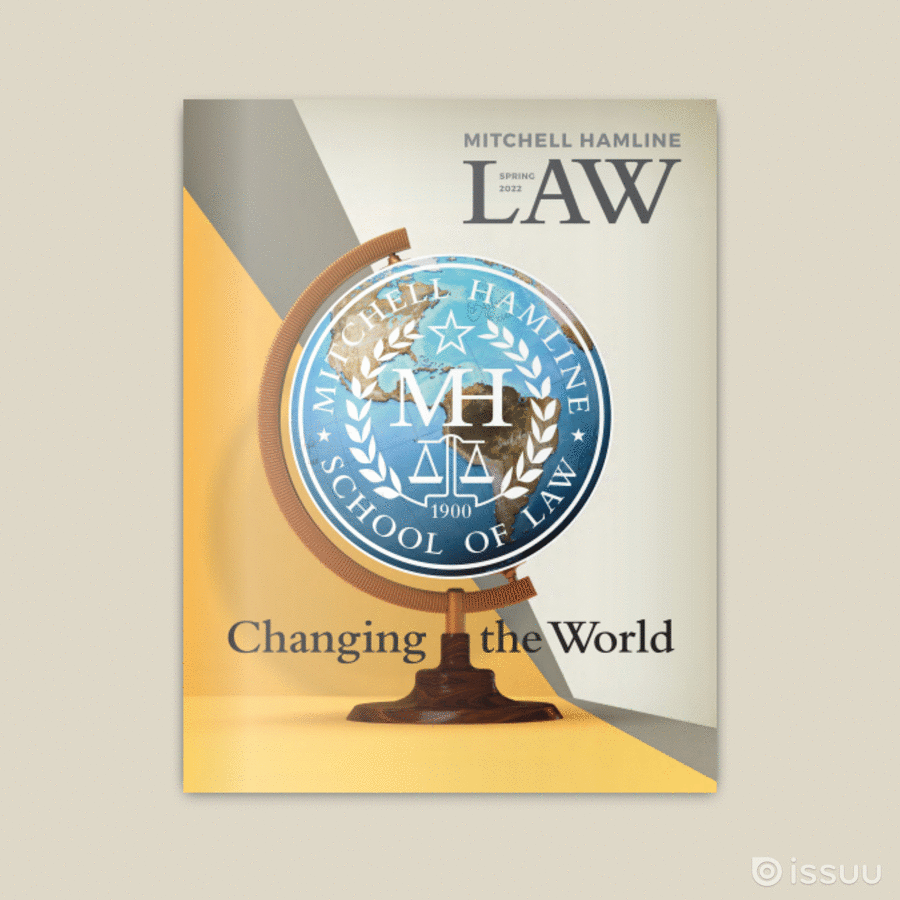
Joelle Lester, Dr. Valerie Yerger, and Doug Blanke at FDA headquarters hand-delivering the original petition requesting the FDA ban menthol in cigarettes on April 12, 2013. Lester and Blanke are with the Public Health Law Center; Yerger is with the African American Tobacco Control Leadership Council.
The Public Health Law Center (PHLC) at Mitchell Hamline celebrated a key victory in 2021 in its long-running battle to snuff out the sale of menthol cigarettes.
The Food and Drug Administration (FDA) announced in April 2021 it would issue rules that ban menthol cigarettes and all flavors including menthol in cigars. The move was direct, if long overdue, response to a formal “citizen petition” written by PHLC and joined by 18 national organizations, including the African American Tobacco Control Leadership Council and the Center for Black Health and Equity.
That petition was first filed in 2013, when PHLC staff delivered several banker’s boxes to the FDA’s offices in Maryland, each containing a copy of the petition and a thousand pages of scientific evidence establishing menthol-flavored cigarettes’ harmfulness and addictiveness.
“Change this big takes way too long, but this is a truly historic agreement,” said Doug Blanke, PHLC’s founder and executive director. “It’s a testament to a handful of visionary advocates for racial justice, and to our own dedicated staff, who are forcing the federal government to do the right thing, despite bureaucratic inertia and the power of Big Tobacco.”
Yet even with the move, Blanke says menthol products might still be in stores for another five years, given the agency’s slowness and the tobacco industry’s litigiousness.
Blanke praised PHLC staff members’ continuing efforts on the menthol ban, including Natasha Phelps, lead senior staff attorney for Minnesota programs. The goal is to improve public health and advance a commitment to equity that PHLC shares with Mitchell Hamline, which became an entirely tobacco free campus in January.
Banning menthol cigarettes is among the most powerful steps the FDA could take to improve public health in the United States, where tobacco use is the leading cause of preventable death, according to the petition. “Menthol cigarettes are the source of addiction for nearly half of all teen smokers,” it continued. “Menthol increases the palatability of smoking, especially among youth and members of racial and ethnic populations, and menthol increases the difficulty of quitting.”

Natasha Phelps of the Public Health Law Center at Mitchell Hamline speaks at an event about the plight of Black Americans and mentholated tobacco products at the National Press Club on May, 23, 2019. Seated to her right are (L-R): Laurent Huber with Action on Smoking and Health; Sharon Eubanks, a former Justice Department prosecutor; and Channte Keith with the National African American Tobacco Prevention Network.
The 2009 Tobacco Control Act, which gave the FDA authority to regulate tobacco products, left menthol as the only flavor still allowed in cigarettes. Desmond Jenson, PHLC’s lead senior staff attorney for federal regulation, called that a “racist exemption.”
“It’s the most important flavor in cigarettes for the tobacco industry to addict nonusers,” Jenson said. “It cannot be overstated just how atrocious that is.”
The tobacco industry long has targeted African American, Latinx and LGBTQ communities in marketing menthol cigarettes, said Joelle Lester, director of PHLC’s Commercial Tobacco Control Programs.
“It’s thrilling to have an opportunity to meaningfully advance equity,” she said. “This is a social justice issue that has been spearheaded by amazing African American leaders.
“And we won’t stop until menthol cigarettes are off the market.”
This article was written by Todd Nelson, a freelance writer in the Twin Cities.

